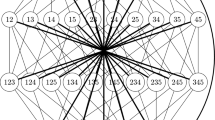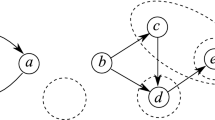Abstract
Wójcicki has provided a characterization of selfextensional logics as those that can be endowed with a complete local referential semantics. His result was extended by Jansana and Palmigiano, who developed a duality between the category of reduced congruential atlases and that of reduced referential algebras over a fixed similarity type. This duality restricts to one between reduced atlas models and reduced referential algebra models of selfextensional logics. In this paper referential algebraic systems and congruential atlas systems are introduced, which abstract referential algebras and congruential atlases, respectively. This enables the formulation of an analog of Wójcicki’s Theorem for logics formalized as π-institutions. Moreover, the results of Jansana and Palmigiano are generalized to obtain a duality between congruential atlas systems and referential algebraic systems over a fixed categorical algebraic signature. In future work, the duality obtained in this paper will be used to obtain one between atlas system models and referential algebraic system models of an arbitrary selfextensional π-institution. Using this latter duality, the characterization of fully selfextensional deductive systems among the selfextensional ones, that was obtained by Jansana and Palmigiano, can be extended to a similar characterization of fully selfextensional π-institutions among appropriately chosen classes of selfextensional ones.
Similar content being viewed by others
References
Babyonyshev S.V.: Fully Fregean Logics. Reports on Mathematical Logic 37, 59–78 (2003)
Barr, M., and C. Wells, Category Theory for Computing Science, Third Edition, Les Publications CRM, Montréal, 1999.
Belnap, N., A Useful Four-Valued Logic, in Modern Uses of Multiple-Valued Logic, J.M. Dunn, G. Epstein, Eds., 8–37, Reidel, Dordrecht-Boston, 1977.
Blok, W.J., and D. Pigozzi, Algebraizable Logics, Memoirs of the American Mathematical Society 77, No. 396, 1989.
Brown D.J., R. Suszko: Abstract Logics. Dissertationes Mathematicae 102, 9–42 (1973)
Celani, S., and R. Jansana, A Closer Look at Some Subintuitionistic Logics, Notre Dame Journal of Formal Logic 42:225–255, 2001.
Celani S., R. Jansana: A New Semantics for Positive Modal Logic. Notre Dame Journal of Formal Logic 38, 1–18 (1997)
Czelakowski, J., Protoalgebraic Logics, Studia Logica Library 10, Kluwer, Dordrecht, 2001.
Diaconescu, R., Institution-Independent Model Theory, Studies in Universal Logic, Birkh¨auser, Berlin, 2008.
Dunn, M., and G. M. Hardegree, Algebraic Methods in Philosophical Logic, Oxford University Press, Oxford, 2001.
Fiadeiro, J., and A. Sernadas, Structuring Theories on Consequence, in Recent Trends in Data Type Specification, Donald Sannella and Andrzej Tarlecki, Eds., Lecture Notes in Computer Science 332:44–72, 1988.
Font J.M.: Belnap’s Four-Valued Logic and De Morgan Lattices. Logic Journal of the I.G.P.L. 5, 413–440 (1997)
Font, J.M., and R. Jansana, A General Algebraic Semantics for Sentential Logics, Lecture Notes in Logic, Vol. 7 (1996), Springer-Verlag, Berlin Heidelberg, 1996.
Font, J.M., R. Jansana, and D. Pigozzi, A Survey of Abstract Algebraic Logic,Studia Logica 74:13–97, 2003.
Font, J.M., and V. Verdú, Algebraic Logic for Classical Conjunction and Disjunction, Studia Logica 50:391–419, 1991.
Goguen, J.A., and R.M. Burstall, Introducing Institutions’, in Proceedings of the Logic of Programming Workshop, E. Clarke and D. Kozen, Eds., Lecture Notes in Computer Science 164:221–256, 1984.
Goguen, J.A., and R.M. Burstall, Institutions: Abstract Model Theory for Specification and Programming, Journal of the Association for Computing Machinery 39:95–146 1992.
Jansana R., Palmigiano A.: Referential Semantics: Duality and Applications. Reports on Mathematical Logic 41, 63–93 (2006)
Visser A.: A Propositional Logic With Explicit Fixed Points. Studia Logica 40, 155–175 (1981)
Voutsadakis G.: Categorical Abstract Algebraic Logic: Equivalent Institutions. Studia Logica 74, 275–311 (2003)
Voutsadakis G.: Categorical Abstract Algebraic Logic: Algebraizable Institutions. Applied Categorical Structures 10, 531–568 (2002)
Voutsadakis, G., Categorical Abstract Algebraic Logic: Tarski Congruence Systems, Logical Morphisms and Logical Quotients, Preprint available at http://www.voutsadakis.com/RESEARCH/papers.html.
Wójcicki, R., Referential Matrix Semantics for Propositional Calculi, in Proceedings of the Sixth International Congress of Logic, Methodology and Philosophy of Science, Hannover 1979, North-Holland and PWN, 1982, pp. 325–334.
Wójcicki, R., Theory of Logical Calculi. Basic Theory of Consequence Operators, Kluwer, Dordrecht, 1988.
Author information
Authors and Affiliations
Corresponding author
Rights and permissions
About this article
Cite this article
Voutsadakis, G. Categorical Abstract Algebraic Logic: Referential Algebraic Semantics. Stud Logica 101, 849–899 (2013). https://doi.org/10.1007/s11225-013-9500-9
Published:
Issue Date:
DOI: https://doi.org/10.1007/s11225-013-9500-9




